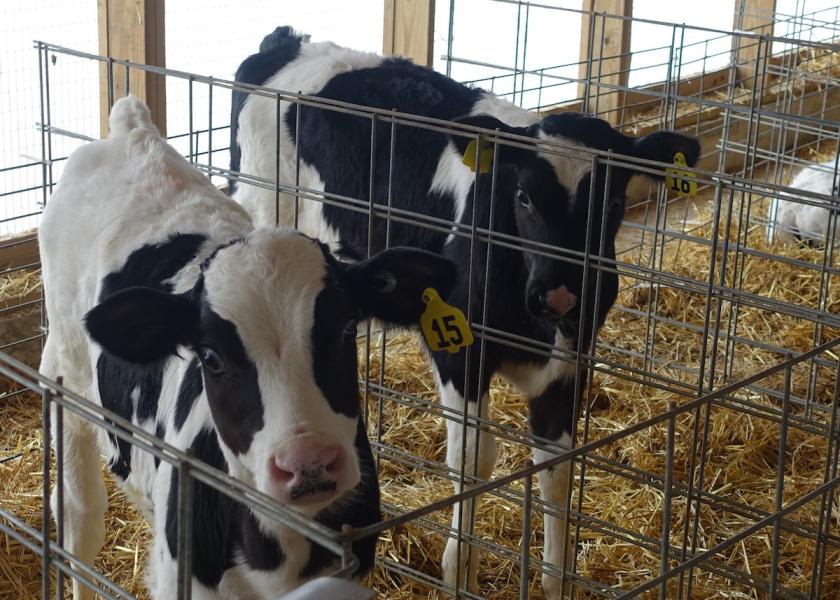3 Offense Tools to Control Crypto in Calves

Cryptosporidia is one of the most common scours-causing pathogens in preweaned calves, surpassing coronavirus, salmonellae, and E. coli, according to Lea Poppe, Regional Technical Manager for German feed additive manufacture EW Nutrition.
One of the reasons those other organisms are on the decline may be that dams can be vaccinated for each of them, with passive immunity passed to calves through colostrum. But in the case of cryptosporidium, which is a parasite, Poppe said neither dams nor calves can be effectively immunized with a vaccine.
Left unprotected, calves are highly susceptible to cryptosporidium infection in the first 3 weeks of life. According to Poppe, scours caused by crypto are typically watery, greenish-yellowish, foul-smelling, and can persist for 1-2 weeks, robbing young calves of critical hydration and nutrition.
When they become pathogenic, cryptosporidia organisms attach to the calf’s intestinal wall, producing an inflammatory reaction and damaging the intestinal microvilli, which interferes with nutrient absorption. This can cause acute systemic hyperacidity in the calf, and interfere with long-term gain performance as well. Poppe cited a Scottish study in which calves experiencing severe cryptosporidosis in the first 3 weeks of life showed a weight gain deficit of nearly 75 pounds per head in the first 6 months of life, compared to healthy calves.
Because cryptosporidia is a parasite and not a bacteria, antibiotic therapy is ineffective in treating clinical cases. Poppe said a high-quality oral electrolyte is the only line of treatment defense to assist calves suffering from cryptosporidiosis. In addition to replacing critical hydration, Poppe noted the buffer substances in electrolytes “reduce the hyperacidity of the blood caused by faulty fermentation in the intestines.”
She noted electrolyte feedings should always be spaced between milk feedings, not in place of them. “Under no circumstances should the feeding of milk or milk replacer be discontinued, because the sick calf urgently needs energy and nutrients,” Poppe declared. “Opinions to the contrary are outdated.”
Poppe said preventing cryptosporidia infections is far preferable to attempts to treat it, citing three major offensive strategies:
- Limiting environmental exposure – Each gram of feces excreted by crypto-infected calves may contain up to 100 million oocysts. Experimental studies have shown that as few as 17 orally ingested oocysts are enough to trigger a new infection. So, limiting on-farm exposure to the organism, which is transmitted via the fecal-oral route, is critical to prevention. Poppe suggested separation of calves from older animals; maintaining a clean, dry housing environment; and sanitation with hot water and effective disinfecting agent when cleaning calf housing and calving areas.
- Colostrum delivery – Reducing cryptosporidia infections is among the myriad benefits of good colostrum quality and delivery. Although colostrum cannot be enhanced with direct immunity against the organism, Poppe said multiple studies have shown that calves with poor colostrum-derived immunoglobulin supply suffer from diarrhea more frequently than calves with good supply.
- Egg immunoglobulin enhancement – A two-step immunity enhancement process has been developed by immunizing hens with disease pathogens and thus stimulating antibodies against them. Eggs produced by those hens are processed into a functional protein powder containing egg immunoglobulins (IgY) against the disease. In the case of cryptosporidia, oocyst shedding has been dramatically reduced by feeding IgY, which can be delivered as a feed additive in calf milk replacer.
“Since there are no effective drugs against cryptosporidia, animals must be prophylactically protected against this disease as much as possible,” concluded Poppe.
For more on calf health, read:
- Can We Improve Colostrum Through Dam Nutrition?
- Nine Ways to Help Resuscitate A Newborn Calf
- The Eyes Have It When Detecting Early Calf Respiratory Disease
- Can We Use Technology to Screen for Sick Calves?
- More Milk Could Mean Faster Healing for Young Calves







